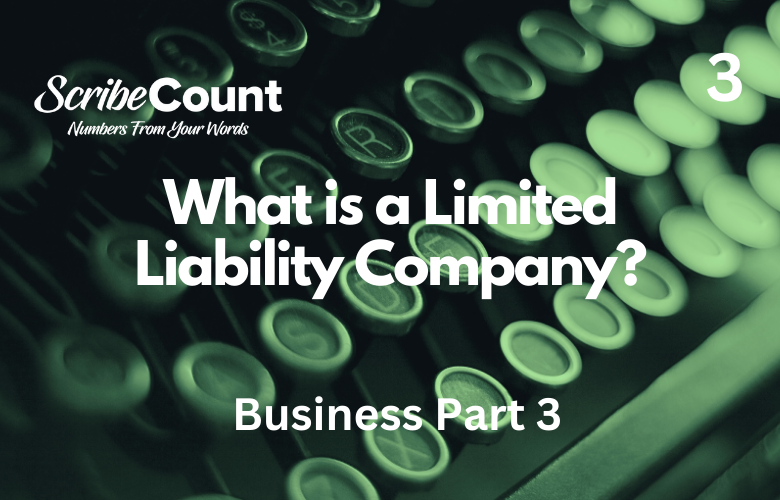What is an LLC and how does it work?
LLC stands for Limited Liability Company and as mentioned there are several advantages to forming one. LLCs were adopted by state law in all 50 states nearly 30 years ago to entice more small business growth. An LLC is most often used to operate a business, or even several, while offering a variety of security and tax advantages. For the self-published author, the LLC becomes the company that produces and sells their books.
Note: It’s important to understand that when you form an LLC you are creating a separate entity. You and your business will no longer be one and the same. An LLC is “separate and apart” from you. It is not you. Your personal assets remain yours while your business assets become those of the LLC. First you form the LLC, then you own and manage that LLC.
Tip: Beware the “C” word. The C in LLC stands for Company, not Corporation. The definition of which is very different. This is important to specify when dealing with your accountant or tax adviser.
Why do I want to form an LLC? What are the advantages?
There are two major advantages to forming an LLC: Security and Taxes.
Security:
The security an LLC provides is its foremost advantage. As mentioned, a Limited Liability Company (LLC), is a legal business structure that is utilized to separate your personal assets, such as your home, your car, your personal bank accounts, your kid’s college fund, your investments, etc, from your business. In other words, it acts as a firewall, or shield from litigation, between you and your company. If your company were to be sued, your personal assets would be out of reach as they are not a part of your business. Creditors would only be able to attack the assets of your LLC in order to settle any business debts and liabilities.
Some would argue that the three ways in which a writer might open themselves up to litigation are from defamation, privacy violations, and infringement claims. This is true, and those violations would most-likely result in the writer themselves being sued and not the company they have formed to market and sell their books. If these three scenarios were strictly the case, the author might be fine with a simple insurance policy.
But there is much more than just writing involved in today’s world of publishing. As we’ve already mentioned several times; all businesses are media companies.
What those three scenarios leave out are all the actions a company takes on the authors behalf. If an author’s LLC should make the mistake of defaming another author, or their publisher, on social media, violating the privacy of a person in the company’s advertising or on their website, or if a company employee should commit a crime while on the job, the protection that having a separate entity provides will be vital.
Granted, there is nothing stopping an aggrieved party from suing both the writer AND the LLC, but this is a tougher fight to win. A good businessman takes the necessary steps to safeguard his or her livelihood from such actions.
Note: There are books out there that are referred to as “High Risk”. These would be books on topics such as Wall Street, Big Business, Big Pharma, Big Data, Big Name, Big Oil, or just plain Big. All of these Big’s have Big Money to spend on legions of lawyers to sue the author for anything and everything they can in an effort to make the authors life a living hell. When this happens, having an LLC offers an additional layer of protection to help counter the onslaught. Short version: Losing your personal assets is much more expensive than setting up an LLC.
Taxes:
Although an LLC is considered a separate entity by the IRS, it does not have its own tax classification. There’s no such thing as being “taxed as an LLC”, instead LLC’s are taxed as another business type. One that does have specific guidelines in place.
Since every LLC is different there is no “best” tax structure. This is where a professional should be consulted. Your accountant will know the best structure for your business. The one that retains the protection your LLC provides to your personal assets, while at the same time keeping your tax debt as low as possible.
NOTE: This is not “Tax Dodging”, this is “Tax Avoidance”. The first is illegal while the second is considered a sound business practice. If you are ever concerned that your accountant may be crossing the line it never hurts to ask. A legitimate accountant will be careful not to even approach anything that endangers their professional license.
Your LLC will be taxed as one of four business types:
● Sole Proprietorship
● Partnership
● C-Corporation
● S-Corporation
Each of these has its pros and cons, but for the self-publisher who has reached a certain income the LLC taxed as an S-corporation is usually the best choice.
Taxes are a subject that requires a detailed explanation. We’ll cover this in-depth in another article. But having options when it comes to paying taxes can save you quite a lot of money.
For these reasons, LLCs are the most popular and the most flexible business structure for the self-publishing author. They offer the most advantages and the least disadvantages. For the Self-publishing author the LLC is “just right”.
So, how does an indie author set up their LLC?
